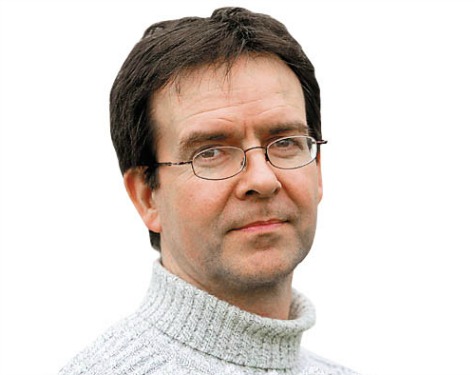 This was a stripped down Opening Ceremony, revealing the truth of so many elements of Britain's history that we take as read in a vivid and beautifully modulated show which presaged a coup de theatre which confounded all the – heated - discussion about Who Would Light The Olympic Cauldron.
This was a stripped down Opening Ceremony, revealing the truth of so many elements of Britain's history that we take as read in a vivid and beautifully modulated show which presaged a coup de theatre which confounded all the – heated - discussion about Who Would Light The Olympic Cauldron.
Not David Beckham. Nor Daley Thompson, nor Kelly Holmes, nor even five-times Olympic champion Sir Steve Redgrave, although all played their part in bearing the Torch on the final stages of long journey to this stadium in east London.
Finally, the ancient Flame was transferred to its temporary resting place by collective youth – seven young athletes nominated by seven of Britain's greatest Olympians and acting jointly to ignite a "Flame of Unity" composed of copper "petals" within a giant bowl in the centre of the stadium which formed itself into a group of firebrands.
Not so much an Olympic cauldron as an Olympic thicket.
And when you think about it, this was entirely in keeping with an Olympics which was drawn towards London rather than Paris by the emphasis the British bidders laid upon what these Games could do for the nation's youth.
Beckham glided on a speedboat up the Thames, along the River Lee, bearing the Flame; Redgrave brought it from the river into the stadium along a lit bridge, playing yet another significant sporting role for his country, but this time not on water but land.
Meanwhile Sarah Stevenson, the 2008 taekwondo Olympic bronze medallist whose parents both died last year and who has overcome injury to secure her place at these Games, took the Athletes' Oath. It was a profoundly touching honour for a determined and courageous competitor – on what was a profoundly touching night.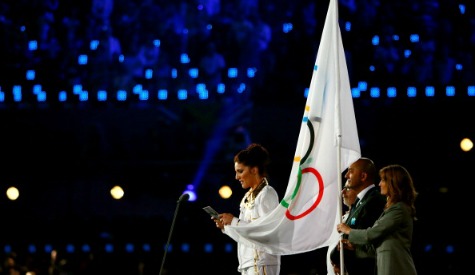 Gone were the huge battalions of Beijing. The stadium was not always filled with noise – images and captions of the screens did much of the necessary work.
Gone were the huge battalions of Beijing. The stadium was not always filled with noise – images and captions of the screens did much of the necessary work.
The central field was not always filled with performers.
The whole show ebbed and flowed, offering successive images and sounds to remind us of and reconnect us with the deepest parts of our national life.
Abide With Me, the setpiece anthem of so many FA Cup finals, was sung with quiet fervour by Akram Khan and Emeli Sande as a small but perfectly formed dance troupe performed in dramatic orange lighting under the disc of an imaginary sun: the old made fresh and new.
The Torch Ceremony was preceded by fireworks and the Arctic Monkeys, playing among other songs the Beatles' Come Together – energy in vivid abundance.
As the teams marched in – to the constant beating of drums – any trepidation about the appearance of North Korea after the Old Trafford flag fiasco was quickly quelled.
It was the correct flag.
Strangely the South Koreans also managed to flourish the correct flag too.
It's not hard, is it?
The succession of excited athletes marching behind their nominated flagbearer and a demurely smiling young maid bearing the name of the nation in a silvery sign above her head recalled directly the Opening Ceremonies of times past. The numerous athletes recording the appearance on mobile phone cameras reminded of times present.
But it is one of enduring richnesses of the Olympics that so many nations are involved, nations that do not tend to find a profile within world sport except for this four-yearly procession: Aruba, Benin, Bhutan, British Virgin Islands, Kiribati, Kyrgyzslan, Federated States of Micronesia, Lao People's Democratic Republic, Nauru, Sao Tome and Principe, Timor Leste...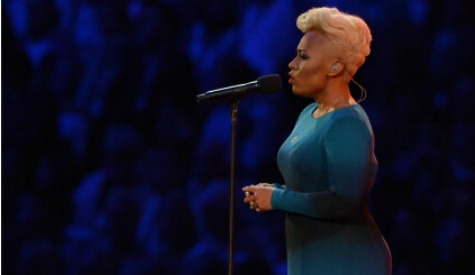 The names, the excited faces, have a cumulative and moving power.
The names, the excited faces, have a cumulative and moving power.
Here the world is, so much of it, and we, Britain, are hosts. 1908, 1948, now.
The turn-out for the United States team was huge – its squad stretched easily down the straight and round the bend.
A statement of intent?
The roar for the British – last, as hosts, but by no means likely to be last in the medals table – was predictably marked.
The team's arrival was marked by a storm of white confetti – mirroring their white outfits with fold trim.
Out they came to the sound of David Bowie's Heroes – just for one night.
Up in the Royal Box, hands clapped along.
Such is the bizarre power of Olympics.
The evening's entertainment had begun peacefully, quietly – bucolically in fact – with pastoral scenes on a British meadow upon which country folk cavorted and real cows, goats and geese blithered about.
Although the cottage in the centre of infield looking , frankly, inflammatory and deserving of the attention of the many fire marshals who have been busying themselves on the Olympic site over the last few weeks.
In a brief appearance before the Ceremony-proper had got underway, the director, Danny Boyle, offered a welcome and a hope that it would not rain – which, but for five minutes, proved founded.
He concluded with a quote from Billy Connolly: "I don't believe in God, but I believe in the people who do" – referencing those who were the keepers of the Olympic spirit.
Not quite sure what he meant by this.
The fervent hope was that the ringing of the Olympic Bell at the end of the countdown minutes after the Ceremony-proper began would not see any repeat of the incident earlier in the day when a handbell rung on camera by the Culture Minister Jeremy Hunt detached itself from its handle and flew just past the head of a nearby young woman.
Hunt's ding-dong moment came as part of the day's Ring The Bells activity – now known as the Great Bells Up.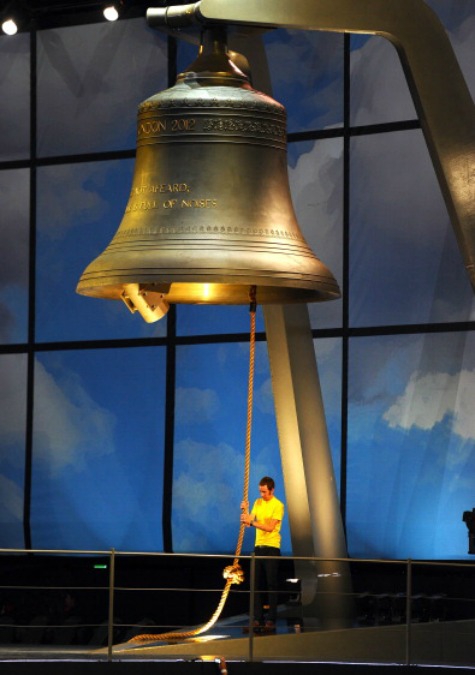 The countdown arrived and was negotiated in orderly fashion, upon which Bradley Wiggins, Britain's first Tour de France winner, arrived in his yellow jersey and approached the biggest bicycle bell he had ever rung and rung it, firmly, once, without referring to raffle tickets or anything else.
The countdown arrived and was negotiated in orderly fashion, upon which Bradley Wiggins, Britain's first Tour de France winner, arrived in his yellow jersey and approached the biggest bicycle bell he had ever rung and rung it, firmly, once, without referring to raffle tickets or anything else.
A choir sang Jerusalem and – smart work on the big display screens – a picture of Jonny Wilkinson wheeling in triumph from that World Cup drop-kick coincided with the words "chariots of fire".
So good that we didn't cut to the ludicrous racing along the sand which has become the quick ID of the film of that name – although we did get a spoof version featuring Rowan Atkinson later, which was also good and in the informal spirit of this event.
As had been rumoured, there was an airing for God Save The Queen – the Sex Pistols' version, that was.
However, the informality of the event did not stretch to playing the line "she ain't no human being"; nor indeed did the excerpt from London Calling by The Clash extend to the bit about "a nuclear error".
The history of our nation was swiftly dealt with as we began with a thunderous depiction of the Industrial Revolution which concluded with an acknowledgement of the great Sigmund Freud – whose groundbreaking work on the human mind began soon after the Revolution had finished – as sex giant smokestack chimneys tumesced their way between banks of green sward.
But, hang on. Wasn't Freud Austrian? (And, of course, I meant six giant smokestack chimneys. Sorry.)
Before long the smokestacks were doing what smokestacks do – it looked a Health and Safety nightmare from where we were sitting two rows in from the action – but then, as we have already established, there were ample fire marshals in attendance.
Soon, however, the fire marshals had something else to worry about: the sight of five Olympic rings of "molten steel" shedding fireworks directly above the head of the bucolic actors on the green fields beneath.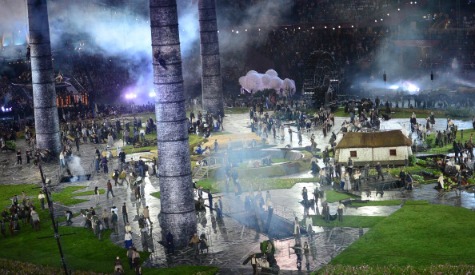 Soon, there was a mighty murmur of surprise as the audience realised that the film showing on the big screen in which Daniel Craig, as James Bond, was ushered into a room in "Buckingham Palace" where a silver-haired "Queen" was seated with her back to him, ignoring him until he cleared his throat, was really showing a room in Buckingham Palace.
Soon, there was a mighty murmur of surprise as the audience realised that the film showing on the big screen in which Daniel Craig, as James Bond, was ushered into a room in "Buckingham Palace" where a silver-haired "Queen" was seated with her back to him, ignoring him until he cleared his throat, was really showing a room in Buckingham Palace.
And, as the turning figure revealed, was really featuring the Queen.
The pair was then shown leaving the Palace en route for a helicopter which then flew over London's landmarks, and under the Olympic Rings suspended beneath Tower Bridge, before reaching the stadium, where they parachuted out.
It soon became clear, however, that spectators had been cruelly duped, as the real Queen arrived in the stand accompanied by the Duke of Edinburgh and the IOC President Jacques Rogge – all very disappointing.
By way of welcome, a choir of children very nicely sang the National Anthem – and more than one verse of it too.
No plastic Brits on show tonight, thank you.
The centrefield then filled with nurses pushing beds – thankfully, despite the late disappearance of the stunt biking and other elements from the Ceremony because of worries about people being able to get transport home, the National Health had avoided further cuts.
Irresistible – spotting the groups and the acts as the Ceremony celebrated British popular music.
Oh yes, we are really good at this. The Who. The Beatles. The Clash. The Jam. The Sex Pistols. The Prodigy. Blur. Dizzee Rascal. Just imagine if Paris had won the bid – it would have been 20 minutes of Johnny Hallyday (is that terribly unkind?).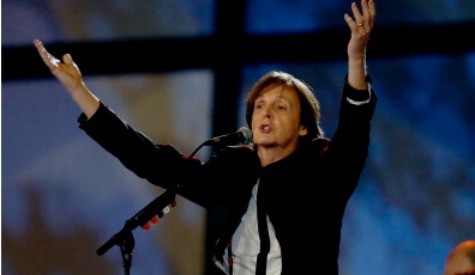 Next, we were invited to join Tim Berners-Lee, inventor of the World Wide Web, as his words "This is for everyone" appeared writ large on the audience.
Next, we were invited to join Tim Berners-Lee, inventor of the World Wide Web, as his words "This is for everyone" appeared writ large on the audience.
In his welcoming address, the London 2012 chairman Sebastian Coe said: "I have never been so proud to be British and to be a part of the Olympic Movement as I am on this day at this moment.
In every Olympic sport there is all that makes life worth living.
"Humans stretched to the limit of their capabilities, inspired by what they can achieve, driven by their talent to work harder than they can believe possible, living for the moment but making an indelible mark on history."
Fine words to conclude a fine and proud occasion
By Mike Rowbottom
Source:www.insidethegames.biz
